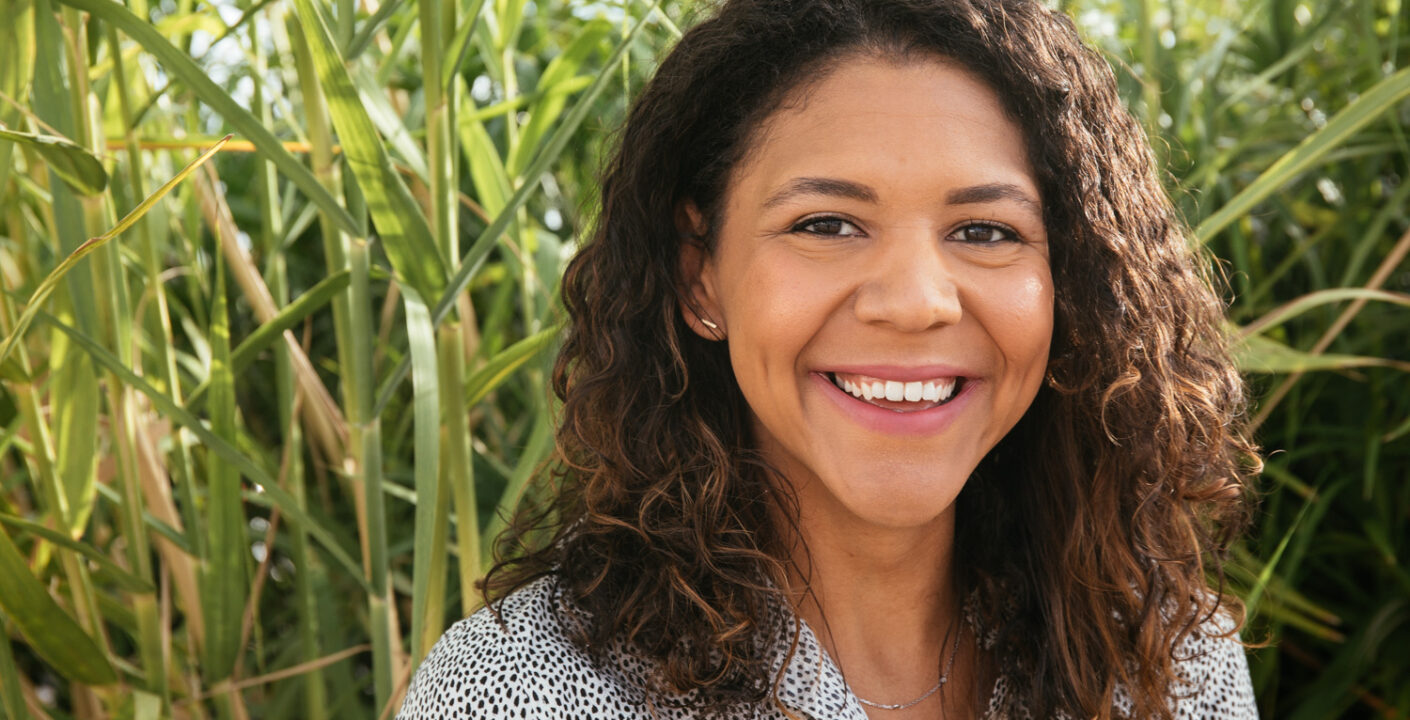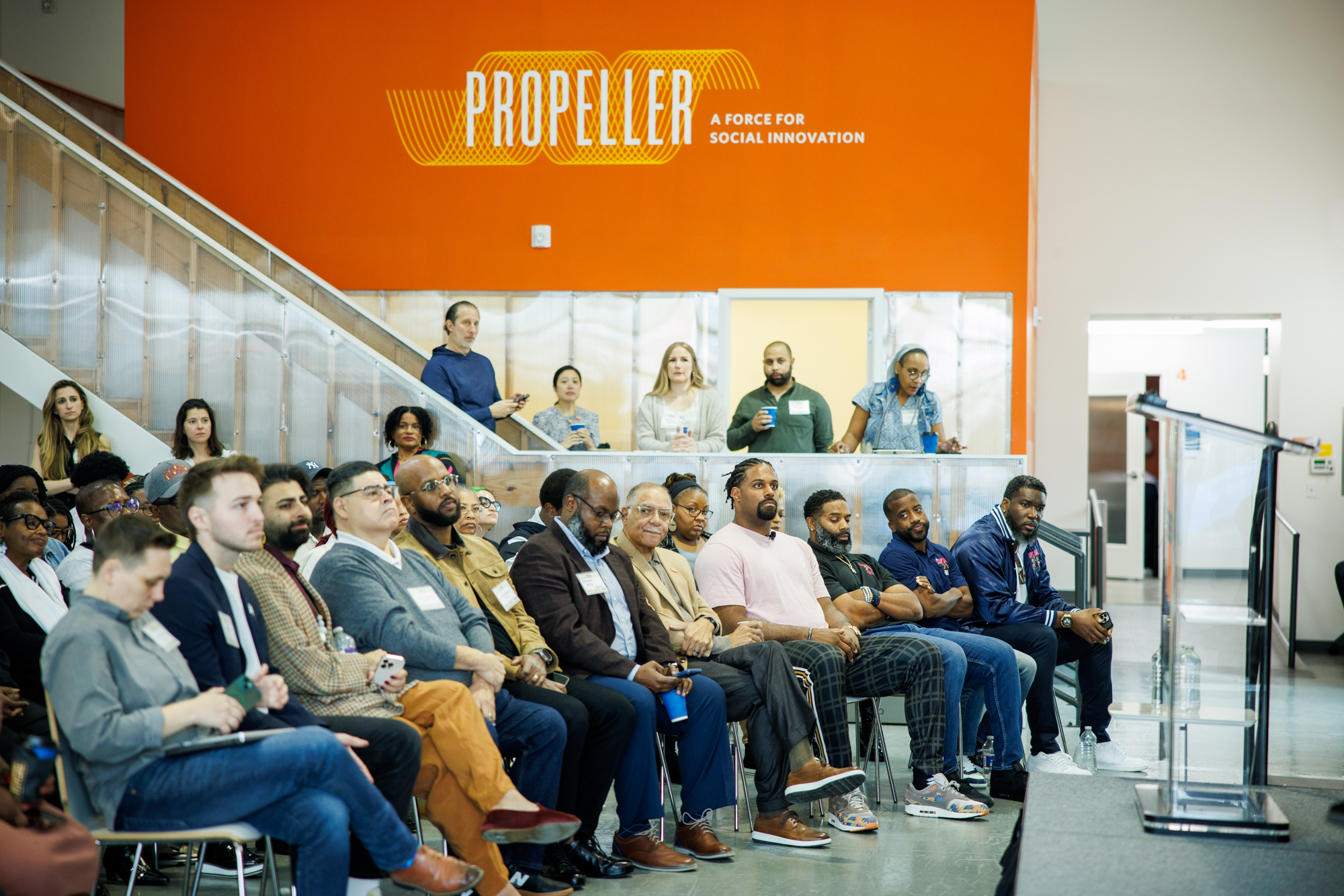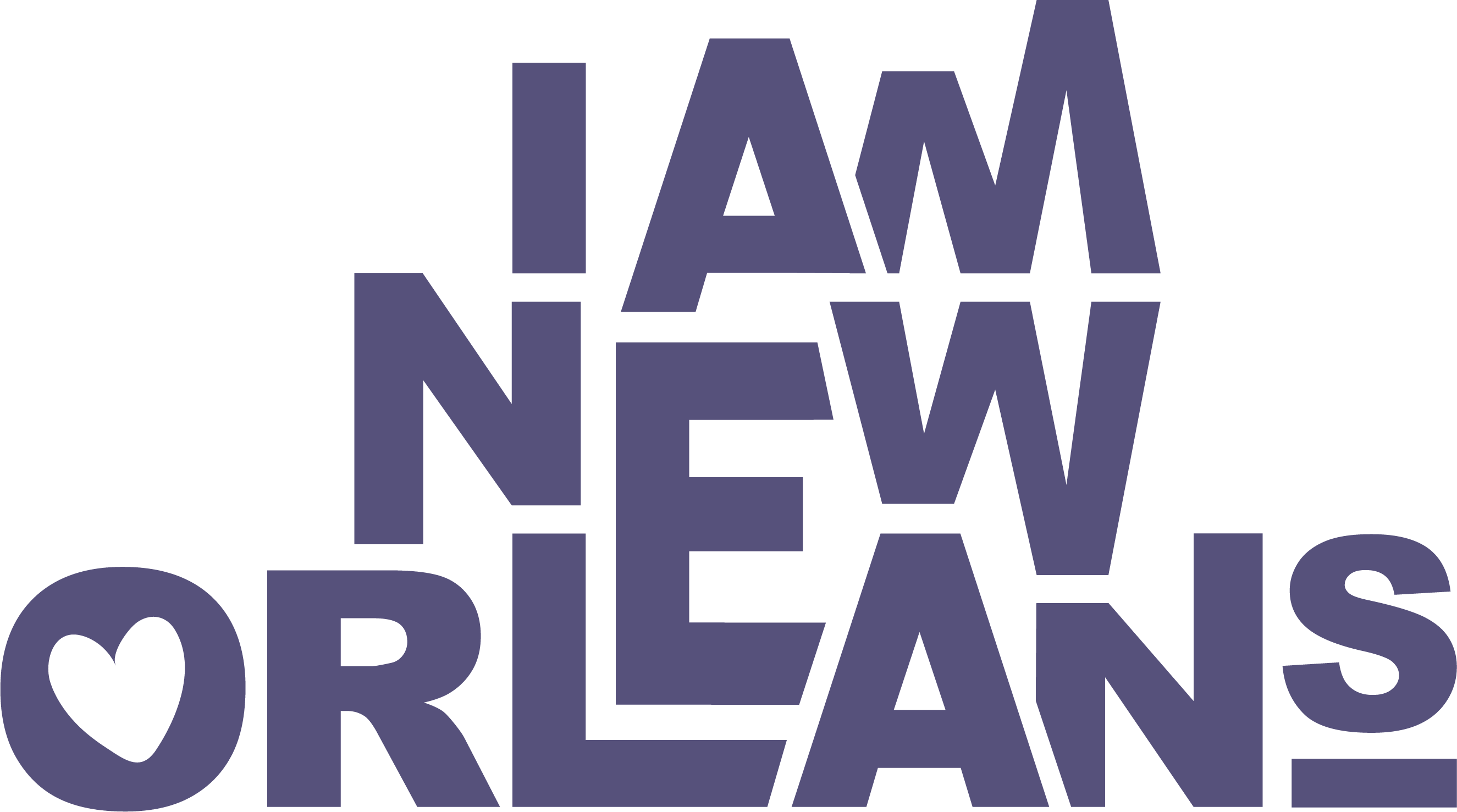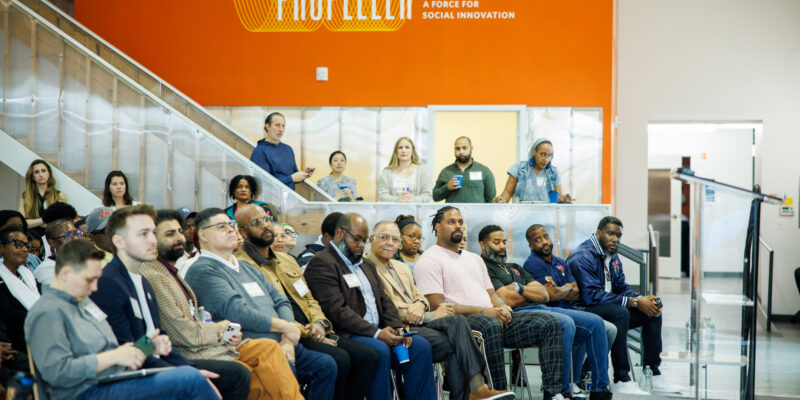Nearly two decades after Hurricane Katrina, the people of New Orleans continue to be a testament to hope, ingenuity and perseverance. Communities have done more than rebuild — they are reimagining systems to create opportunity for all, especially children. While significant progress has been made, critical work remains to ensure that growth is truly equitable and lasting. As part of an ongoing reflection series called Rooted In Us, W.K. Kellogg Foundation (WKKF) staff and local leaders will share their perspectives on community efforts, lessons learned and the investments still needed to build a future where all New Orleanians can thrive.
In this conversation, Alyson Curro, a communications officer for the Kellogg Foundation, sits down with Jessica Allen, CEO of Propeller, a New Orleans-based nonprofit that has supported hundreds of local entrepreneurs and small businesses since its founding in the post-Katrina recovery period. Their conversation explores the city’s evolving entrepreneurial landscape, the power of business to drive systems change, and what it takes to build an economy rooted in equity, resilience and opportunity for all.
Curro: Let’s start at the beginning. Before Katrina, what did the landscape for entrepreneurship and small business support look like in New Orleans, and what have been the big shifts since?
Allen: One of the biggest shifts we’ve seen since Katrina is how New Orleans has changed — especially when it comes to the strength of the Black middle class. Before the storm, there were many Black-owned businesses supported by a strong, rooted middle class. But after Katrina, that community was deeply disrupted. There was often a lack of support to help the Black middle class reestablish itself here. That’s impacted small businesses significantly — particularly Black-owned businesses — as neighborhoods have changed and the customer base has shifted. That’s been a big challenge to how those businesses operate and thrive today.

Curro: When you think back to the years following the storm, what role did Propeller play in the city’s recovery, and how has that evolved over time?
Allen: After the storm, if you were coming back to New Orleans, it was because you wanted to be here. That kind of commitment meant people were returning with a vision for how the city could be better. Propeller became a space where people could harness that energy and turn it into action. In those early days — and even now — our entrepreneurs are often people who’ve identified gaps in systems and want to do something about them. Whether it was cleaning up neutral grounds or advocating for infrastructure improvements, people were stepping up to rebuild the city from the ground up. Propeller gave them a space to do that through entrepreneurship.
Curro: What’s one story or moment from those early years that really captures Propeller’s purpose — or the challenges the community was facing?
Allen: In those early years, we were called Social Entrepreneurs of New Orleans. Our first accelerator classes were focused on supporting what we called social entrepreneurs, folks who weren’t just trying to build a business, but trying to drive positive change in the city. What we learned quickly was that to improve long-term health and well-being in New Orleans, we couldn’t just support business development. We also had to focus on closing gaps in systems, especially in areas like water, education, health and economic mobility. That’s how we launched our first Water Impact Accelerator, focused on how we live with and manage water in the city. The goal wasn’t just to solve for today’s problems — it was to change the conditions that would allow people to thrive here in the future.
Curro: Propeller has supported hundreds of entrepreneurs and small businesses since 2009. What are some of the systemic barriers you’re helping leaders and founders overcome today?
Allen: We’ve worked with over 300 entrepreneurs through our Impact Accelerator, and they’ve collectively generated over $300 million in revenue and financing. In recent years, we’ve expanded our work to support entrepreneurs throughout their journey, whether they’re just starting out or looking to scale. In 2024 alone, we worked with over 650 entrepreneurs through free workshops, one-on-one strategy sessions and formal programs like our accelerator and inclusive procurement training. But the two barriers that consistently show up, especially for Black and BIPOC-owned businesses, are access to capital and procurement opportunities. Those are the areas where people hit roadblocks, even after they’ve done everything else right. And they’re also the areas that allow businesses to grow, hire and contribute to the local economy when they’re given a real shot.
Curro: Those are incredible numbers. I’m not asking you to pick favorites…but are there particular entrepreneurs or businesses that really embody the kind of future you’re helping build?
Allen: If you stop by our coworking space in New Orleans, you’ll see a wall filled with photos of our accelerator alumni. It’s amazing — people walk in and say, “Hey, I know that person!” That sense of community, of connection, is what the Propeller network is all about. One entrepreneur who really comes to mind is Kimberly Novod, founder of Saul’s Light Foundation. I met her at an info session for one of our pitch competitions back when I was managing our health programming. She was doing Saul’s Light on the side at the time — it was inspired by her own experience as a NICU mom, and she wanted to provide other families with support during that incredibly hard journey. She ended up winning the pitch competition and later joined our Impact Accelerator. One of her goals was to make Saul’s Light her full-time work, and we helped her move in that direction. Since then, the growth has been incredible: last year alone, Saul’s Light supported over 200 families. They now have partnerships with six local hospitals, which is something we began working on together during the accelerator. She’s also grown her team, which ties back to one of our key goals: job creation in New Orleans. What’s powerful is that Kimberly’s work isn’t just about individual care — it’s also about systemic change. Saul’s Light has been active in advocacy, pushing for policy that improves experiences and outcomes for NICU families. That’s the kind of entrepreneur we love to work with — someone building a strong, values-driven organization that meets immediate needs and drives lasting change.

Curro: How has Propeller’s approach changed over the past 15 years, especially as community needs have evolved?
Allen: We aim to be an organization that is flexible and nimble — responsive to the ever-changing needs of our entrepreneurs. In recent years, that’s meant expanding our programming beyond our Impact Accelerator, which still remains a cornerstone. We realized we needed to support alumni of that program as they encountered new barriers — sometimes two or five years down the road.
That’s led to initiatives around accessing capital and inclusive procurement, helping entrepreneurs grow through debt or equity investment, or by winning bids in both the private and public sectors. These strategies help increase revenue and enable businesses to grow their teams. When we talk about increasing business receipts for BIPOC and under-resourced entrepreneurs, this growth—moving from sole proprietorships to employer firms — is a big part of that. We’ve put a lot of emphasis into these areas in recent years because we know they help make that shift possible.
Curro: What are the most pressing needs or underinvested areas in your focus Sectors?
Allen: We see many needs across our five focus sectors — food, health, water, education and community economic development — but I’ll highlight a couple.First, education. In recent years, we’ve focused our education programming on supporting early childhood education [ECE] center leaders. We all saw during the pandemic that the world stops when childcare does. With the investment from the city millage to expand ECE seats in New Orleans, we developed programming to support that growth. It’s critical — not just for families, but for the broader economy. When people don’t have access to affordable, quality childcare, they can’t work.
Unfortunately, we’re seeing disinvestment in ECE right now, and many of the supports these leaders have relied on are in flux. We’re actively exploring ways we can augment our resources to support them as the environment continues to shift. Second, water. We all know the water issues in New Orleans. We lose a football field of land every 90 minutes. We have to park on the neutral ground after even a light summer storm. We’re working to build a green infrastructure industry that creates good jobs and addresses the water-related challenges New Orleanians face every day.
Curro: It’s been 20 years since Katrina and more than 15 years since Propeller was established. What support — policy, philanthropic, public — do your entrepreneurs still struggle to access?
Allen: A major one is access to flexible capital to grow their businesses. We know there are huge disparities in venture capital funding, and it’s even harder to come by in the South. We work with incredible businesses here in New Orleans, many of which are primed for investment, but the capital just isn’t reaching them.
That lack of capital has held back the full potential of our entrepreneurial ecosystem. While we continue to support entrepreneurs in accessing debt capital and other available vehicles, we’re constantly in conversation around finding new, patient forms of capital that can better serve their needs.
Curro: What would it take for every New Orleanian to be able to imagine — and build — a business or career rooted in their community?
Allen: New Orleans has always had a strong history of entrepreneurship — even when the investment hasn’t matched the potential. Our entrepreneurs are focused on solving community problems, whether that’s addressing social, health or environmental disparities or creating local jobs.
When entrepreneurs are supported in building businesses here, it often comes from a place of asking, “How do we make New Orleans better?” We need more investment from both the public and private sectors to help those ideas grow. And we need to develop industries that meet the needs of New Orleanians, not just those of our visitors. We’re proud to be world-class at hospitality, but there’s room — and a need — for industries that support the everyday lives of residents, too.
Curro: What do you want others to understand about the work of local organizations like Propeller in shaping that more just, equitable New Orleans?
Allen: Propeller has a lot of programming and initiatives — but we know we can’t do this work alone. That was true after the storm, and it’s still true now. Long-term change requires partnership and collaboration. People often associate business with competition, but we place a bigger focus on collaboration. Our small business community is greater than the sum of its parts. One of the things we love seeing is alumni partnering with each other. We tend to attract people with a shared north star — a vision for the city and a desire to use their businesses to contribute to that future
Curro: What gives you optimism — or what keeps you going in this moment? Where do you find inspiration or joy?
Allen: What gives me optimism is knowing that we already have many of the tools and strategies we need to move closer to economic justice in New Orleans. A lot of these solutions have been tested — here and in cities like ours. And we’ve seen where they’ve worked.
During the pandemic, when capital infusions became available — especially for business owners without access to family wealth — Black entrepreneurs had the highest percentage of new business starts. That’s telling. It’s hard work for our team, and we know change won’t happen overnight. But the fact that we know what works — and we’ve seen movement — helps keep our vision clear at Propeller.
Curro: Anything that you’d like to add before we wrap up?
Allen: There have been a lot of fits and starts in entrepreneurship and small business development in New Orleans. But I remain encouraged — not only by the entrepreneurial spirit here, but also by the growing clarity around the pathways to improve outcomes for all entrepreneurs.
At Propeller, we just hope to be part of those journeys — to help build a New Orleans that improves the health and well-being of all.
Want to learn more about Propeller and their work to support entrepreneurs, grow equitable economies, and build climate-ready careers in New Orleans? Visit gopropeller.org to explore their programs, impact and ways to get involved.
Propeller also offers a coworking space that is open to the public Monday-Friday at 4035 Washington Ave. If you have a business idea or just want to learn more, stop by — they can set up a strategy session to point you in the right direction, whether that’s with them or another ecosystem partner in New Orleans.
Get stories, resources and updates from WKKF
Surrounding the 20th anniversary of Hurricane Katrina, we’re sharing powerful stories through our Rooted in Us series — plus events, tools and equity-driven news rooted in New Orleans, Mississippi and beyond that helps all children and families thrive.


Comments